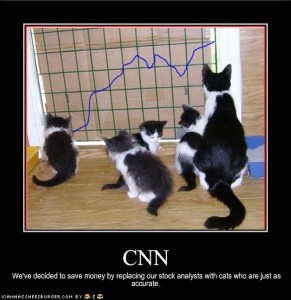 I am a single guy. I have a retirement income of approximately the median income of a family of four. That means that I enjoy “surplus capital”–income I don’t need after I pay the rent, put food on the table, etc. Yes, I spend some of that “surplus capital” on non-essentials–computer, camera, music, etc. That does create jobs. But I spend several hundred dollars each month on “investments”–several mutual index funds.
I am a single guy. I have a retirement income of approximately the median income of a family of four. That means that I enjoy “surplus capital”–income I don’t need after I pay the rent, put food on the table, etc. Yes, I spend some of that “surplus capital” on non-essentials–computer, camera, music, etc. That does create jobs. But I spend several hundred dollars each month on “investments”–several mutual index funds.
Now, you may think those “investments” create jobs. They don’t. When a business expands it issues stock in an Initial Public Offering (IPO) or auctions bonds. The sale of these equities yields capital that is used to expand–i.e., create jobs. Stock represents “ownership” of the company, bonds represent a debt obligation of the company. Most of us do not buy IPO stock or participate in bond auctions. Neither do most mutual funds.
Whether we buy individual stocks and bonds from a brokerage house or shares in a mutual fund we are buying securities from other owners of those securities. These exchanges do not result in new capital for the corporations, that occurred in the IPO or auction. All we are doing is moving ownership of existing plant and labor around; it does not yield new plant or new jobs. What results in REAL investment is consumer demand for goods and services, which cause businesses to seek NEW capital for new plant and labor through reinvested profits, IPO and bond auctions. If demand for goods and services is absent, profits become “retained profits” which may be used to buy back stock, to accelerate pay of debt or to buy existing stocks and bonds. Again, this does not result in new capital for REAL investment in plant and labor–i.e., do not create jobs.
What we “capitalists” are doing is not investment. It is speculation. We hope to obtain dividends the speculation. Note that in some cases, those dividends may be taxed at 15% regardless of income and in some cases at 0%. We also hope that the stocks and maybe the bonds appreciate in value over time, so that when we sell we will experience a capital gain (again, if held for a year, taxed at 15% regardless of income). Even if we sell at a loss, we experience a gain of sorts because the capital loss decreases our overall tax liability. Essentially what we are doing is gambling; generally speaking, the odds are better than the lottery, casino or slot machines. But we are gambling, not creating jobs.
My market speculation is an infinitesimal drop in the equity markets. It doesn’t create jobs. If I spent that money on useless widgets, I would be creating jobs. But if you are talking about the trillion or more dollars of corporate retained earnings, you are talking about a huge amount of “capital” which is expended in speculation in such things as Collateralized Debt Obligations, Credit Debt Swaps and equity purchases. This inevitably leads to economic “bubbles” as this activity drives up the cost of financial paper. Eventually, though the bubble bursts. It always does. It always will. It is a kind of grand, legal ponzi scheme. It is what has been behind the recession and bust of 2007. It is what was behind the dot-com bust of 2001. It is what was behind the recession of the early 90s and 80s. It is what was behind the Great Depression. It is what was behind the panic of the 1890s.
– Ken Peck


